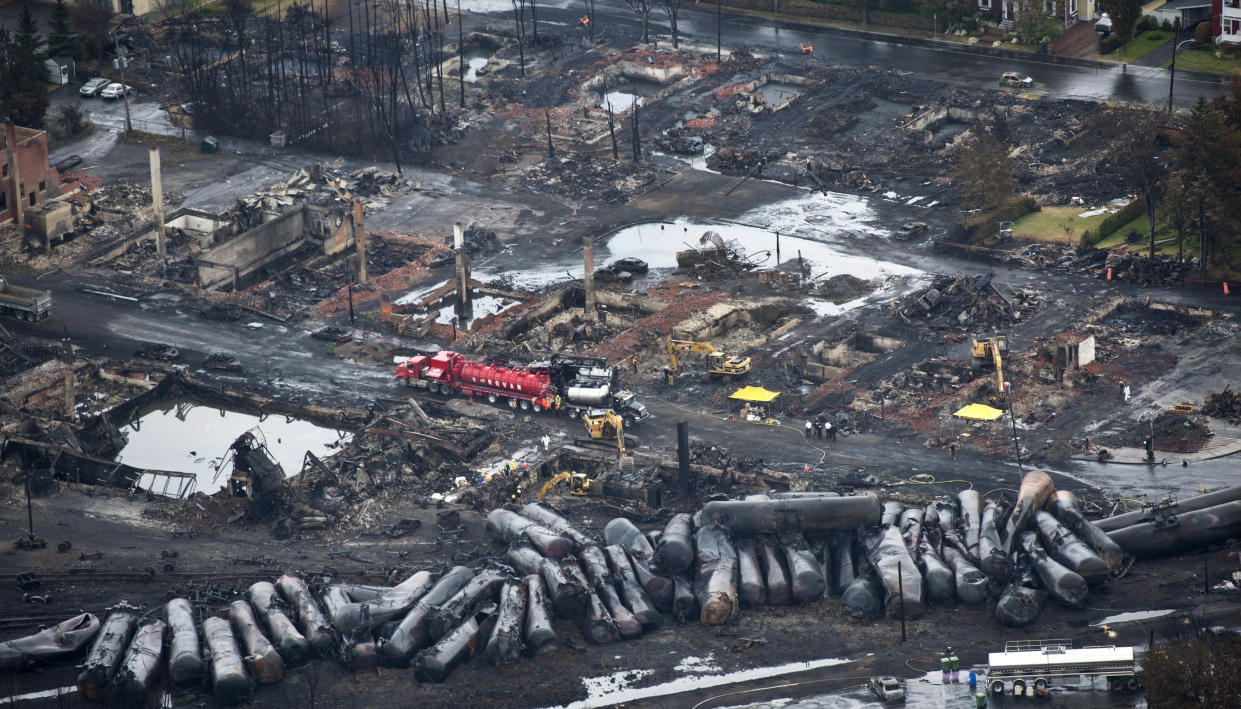Canada toughens train rules after deadly disaster
Canada toughens safety rules for trains with dangerous goods following catastrophic crash

FILE -- In a July 9, 2013 file photo workers comb through debris after a run away oil train derailed July 6, 2013 causing explosions, fire and destoying parts of Lac-Megantic, Quebec. Canadian transportation authorities banned one-man crews for trains with dangerous goods Tuesday, July 23, 2013, responding to calls for tougher regulations after the oil train derailment in Quebec killed 47 people. (AP Photo/The Canadian Press, Paul Chiasson, file)
TORONTO (AP) -- Canadian transportation authorities banned one-man crews for trains with dangerous goods Tuesday, responding to calls for tougher regulations after an oil train derailment in Quebec killed 47 people.
Transport Canada also said trains with dangerous goods will not be allowed to be left unattended on a main track. Hand brakes must be applied to trains left one hour or more.
The July 6 tragedy occurred when a runaway train carrying 72 carloads of crude derailed, hurtled down an incline and slammed into downtown Lac-Megantic. Several train cars exploded and 40 buildings were leveled. The unattended Montreal, Maine & Atlantic Railway train had been parked overnight on a rail line before it came loose.
"The disaster brought to light several industry practices which have caused some concern," said Gerard McDonald, assistant deputy minister of safety and security at Transport Canada. "Given that and with an abundance of precaution, we thought it would be prudent to implement these measures now."
Transport Canada says the cause of the derailment remains unknown. Canada's Transportation Safety Board, which is investigating the accident, had asked for changes in regulations governing rail traffic.
Transport Canada also is giving rail operators five days to ensure nobody without authorization can enter the cab of unattended locomotives on a main track or sidings.
Meanwhile, the town of Lac-Megantic is taking legal action against Montreal, Maine & Atlantic.
Mayor Colette Roy-Laroche said the rail company has not yet paid any of the workers it hired to clean up the crude oil that leaked from dozens of tanker cars. She said at a news conference that the town paid the workers $4 million after some threatened to walk off the job. Lawyers have been asked to inform the rail company it must reimburse the money immediately, Roy Laroche said.
The company did not immediately respond to a message seeking comment.
A Chicago-based law firm has begun filing wrongful-death lawsuits on behalf of victims of the Quebec railway disaster in a U.S. court against the rail and oil companies involved in the accident.
Peter Flowers, of the law firm Meyers & Flowers, had filed two lawsuits by the end of Tuesday, and was expected to file five more lawsuits on Wednesday at the Cook County courthouse in Illinois.
"We expect 15 to 20 at least over the next couple of days," Flowers said Tuesday. "We'll be asking for millions of dollars for every one of these folks. ... This is a horrible tragedy."
Flowers' first lawsuit, filed Monday, was initiated by the family of Jean-Guy Veilleux, who was killed in the runaway train disaster.
It seeks damages from 10 defendants, including Montreal, Maine & Atlantic; its major stockholder Rail World Inc.; Edward Burkhardt, president of Rail Road and chairman of MMA, and several U.S. petroleum companies. The train was carrying North Dakota oil destined for a refinery in St. John, New Brunswick.
Calls placed Tuesday to most of the defendants listed in the lawsuit were not immediately returned.
The lawsuit alleges that the railway and petroleum companies named had a duty to operate their businesses in a "safe manner and to take reasonable measures to avoid exposing the public to the dangers associated with the transport of crude oil to refineries."
The lawsuit also alleges that the defendants were negligent for transporting crude oil in flawed DOT-111 tanker cars. The safety of these tanker cars has been called into question by the U.S. National Transportation Safety Board since a 1991 study found that they were known to rupture at a high rate during derailments.
Burkhardt was the only individual listed in the lawsuit. The lawsuit alleges that Burkhardt has a past record as a top executive with other railway companies of reducing crew sizes to cut costs — a measure that allegedly increased the accident rate.

